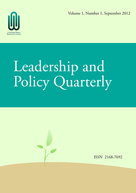


Volume 13 Issues 3-4 (2024-12-31)
Volume 13 Issues 1-2 (2024-06-30)
Volume 11 Issues 1-4 (2022-12-31)
Volume 10 Issues 1-4 (2021-12-31)
Volume 9 Issues 1-3 (2020-09-30)
Volume 8 Issues 3&4 (2019-12-31)
Volume 7 Issues 1&2 (2018-06-30)
Volume 6 Issues 3&4 (2017-12-31)
Volume 6 Issues 1&2 (2017-06-30)
Volume 5 Issues 3&4 (2016-12-31)
Volume 5 Issues 1&2 (2016-06-30)
Volume 4 Issues 3&4 (2015-12-31)
Effective leadership in higher education is crucial for driving institutional success and transformative change, particularly in a rapidly evolving educational landscape. This paper identifies key leadership traits — visionary thinking, adaptability, emotional intelligence, collaboration, decisiveness, communication, and ethical leadership — that are essential for leaders to navigate contemporary challenges such as technological innovation, global competitiveness, and diverse student demographics. It explores how these traits influence institutional culture, mission, and strategic goals, ultimately shaping long-term success. Drawing on case studies of successful leadership in both public and private institutions, the paper highlights the impact of these traits on institutional transformation and offers lessons for higher education leaders. Additionally, the paper addresses the challenges in cultivating these traits, including institutional culture, resource limitations, and resistance to change, and offers strategies for developing future leaders through targeted leadership training and development programs. The paper concludes with a call for higher education institutions to prioritize leadership development at all levels to ensure sustainable institutional growth and prepare institutions for the future.
Artificial Intelligence (AI) tools, ranging from grammar checkers to sophisticated generative AI systems, have redefined the ways students and educators approach academic writing. While these tools offer significant benefits, such as improving efficiency, providing feedback, and enhancing the quality of written work, they also raise critical questions about authorship, originality, and authenticity. The institutional response to AI in academic writing is the focus of this article. It provides a framework for creating policies that balance innovation with ethical responsibility. Drawing on examples from institutions around the world, it offers practical guidance for faculty and administrators seeking to develop clear, equitable, and enforceable guidelines.